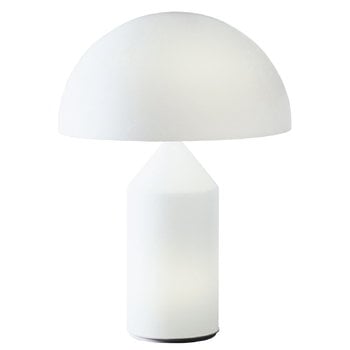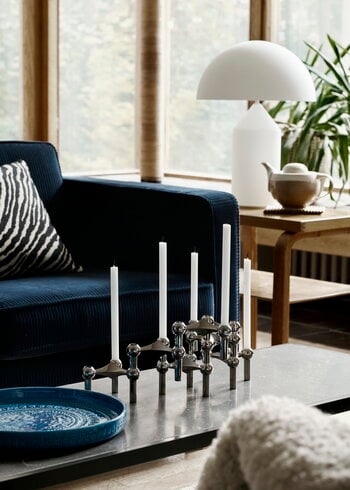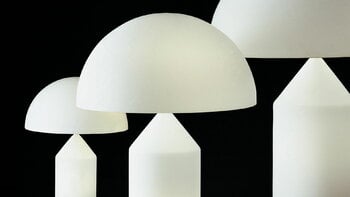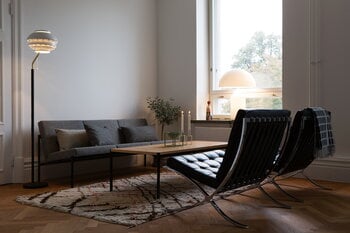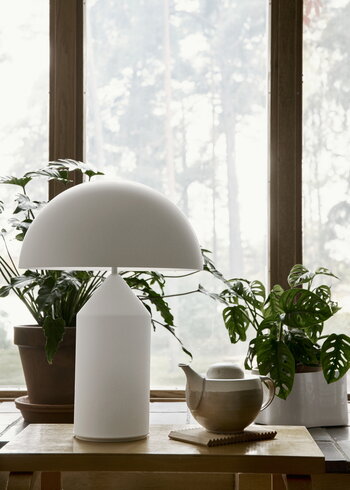Atollo 235 table lamp amazes with a beautiful opaline blown Murano glass diffuser and its height reaching to 27.56 x 0 in (70 x cm. cm). The smoothly glowing appearance is perfected with a separately adjustable lamp located inside the base cylinder. Designed by Vico Magistretti in 1977 for the Italian lighting company Oluce, the Atollo lamp has been said to completely revolutionize our image of a classic table lamp. Combining geometrical shapes of cylinder, cone and hemisphere, Atollo is a lamp that is extremely refined and bold at the same time, and it has become an icon of modern Italian design. Atollo won the 1979 Compasso d’Oro design award and it belongs to permanent collections of many significant art museums.
Atollo 235 table lamp, white
Oluce
Description
Atollo 235 table lamp amazes with a beautiful opaline blown Murano glass diffuser and its height reaching to 27.56 x 0 in (70 x cm. cm). The smoothly glowing appearance is perfected with a separately adjustable lamp located inside the base cylinder. Designed by Vico Magistretti in 1977 for the Italian lighting company Oluce, the Atollo lamp has been said to completely revolutionize our image of a classic table lamp. Combining geometrical shapes of cylinder, cone and hemisphere, Atollo is a lamp that is extremely refined and bold at the same time, and it has become an icon of modern Italian design. Atollo won the 1979 Compasso d’Oro design award and it belongs to permanent collections of many significant art museums.
Product details (15)
- Material
- Aluminium, opaline blown glass
- Colour
- White
- Width
- 19.69 in (50 cm)
- Diameter
- 19.69 in (50 cm)
- Height
- 27.56 in (70 cm)
- Bulb base
- 2 x E27, 2 x E14
- Light source
- 2 x E27 dimmable max 100W (not included) + 2 x E14 max 25W halogen (included)
- IP rating
- 20
- Protection class
- I
- Voltage
- 220–240 V
- Certifications and labels
- CC, CB, UL, CCC
- Plug
- EU plug
- Cable colour
- Black
- Dimmable
- Yes
- Notes
- Base diameter 7.87 in (20 cm)
- Product ID
Designer
The Italian designer Vico Magistretti (1920-2006) had a long career as an architect and furniture designer. Magistretti started studying architecture in Milano in 1939, but had to escape to Switzerland in 1943. In Switzerland he met Ernesto Nathan Rogers, who became Magistretti’s maestro.
Returning to Milan in 1945 he finished his studies and started working for the architect Paolo Chessa. In the beginning of his career Magistretti worked as an urban planner and started designing furniture and lamps in the 1950s. Many of the objects he designed became museum pieces. During his long and fruitful career he also won several awards like two Compasso D’Oro awards.
View all productsReviews (0)
Sustainability
The Product Sustainability Framework, our criteria of sustainable design, helps you find the most sustainable products in our selection. Read below which sustainability criteria this product has met.
Working conditions & labour 7/9
-
Equal opportunities for all employees
-
Commitment to UN Global Compact, fair compensation for all employees
-
Corporate responsibility requirements defined and communicated for suppliers
-
Systematic work for improved inclusion and well-being in the workplace
-
Transparent supply chain
-
Suppliers' compliance to a code of conduct ensured
-
Compliance to the UN Guiding Principles on Business and Human Rights ensured in the supply chain
-
Direct suppliers audited and certified
-
Support for community involvement in the supply chain
Eco-friendly production 8/9
-
Fair and resource-wise water-use in production
-
No incineration or landfilling of returned items
-
No use of endangered species as materials
-
No direct environmental emissions or waste (excl. GHGs) from production
-
The sustainability of direct suppliers' production is addressed and monitored
-
Production and material sourcing that respect biodiversity, animal rights, and natural ecosystems
-
Material-efficient and ecological packaging
-
No potentially harmful chemicals used in own production
-
Positive impact on nature’s well-being through operations that regenerate natural ecosystems
Climate impact 5/8
-
Company's direct greenhouse gas emissions identified and commitment to reduction
-
Product's carbon impact identified and commitment to reduction
-
Guidance on energy- and eco-efficient use of the product
-
Low-carbon or compensated transportation
-
Carbon neutral or carbon negative product
-
Contribution to climate initiatives beyond the brand’s direct operations
-
Carbon footprint of the product calculated and goals set to reduce it
-
100 % renewable energy in own production and operations
Sustainable materials 6/6
-
Sustainable and long-lasting material choices
-
No harmful or hazardous substances
-
Responsible raw material sourcing and production
-
Materials suited for circularity: monomaterials, recyclable finishings, renewable or recycled contents etc.
-
Ecological materials: natural, biodegradable, recyclable or recycled contents
-
Outstanding materials in terms of innovativeness, responsibility, sustainability and circularity: local production or sourcing, 100 % recycled content, C2C-certification etc.
Circular design 5/5
-
High aesthetic quality promoting long-term use of the product
-
Technically durable product design and material choices
-
Design for enduring life-long quality
-
Design and support for product maintenance, repair and upgradability
-
Innovative circular design solutions: circular service system, resale platform, remanufacturing, collection of used products, etc.

